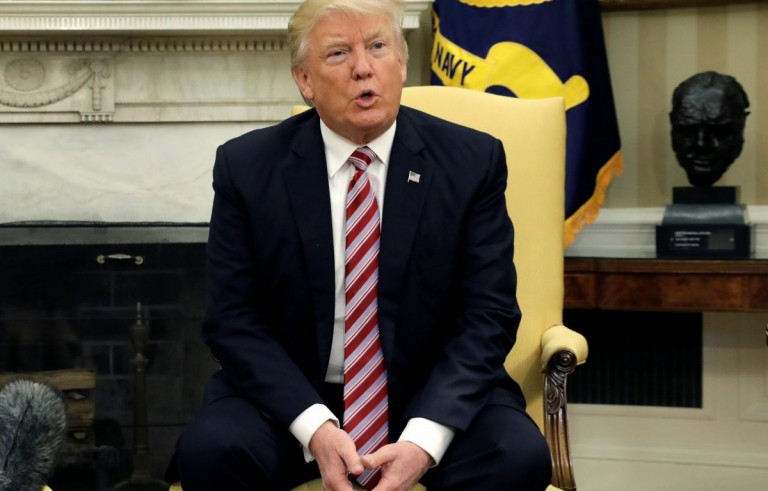HARI SREENIVASAN, PBS NEWSHOUR WEEKEND ANCHOR: Good evening and thanks for joining us.
For the second day in a row, Russian President Vladimir Putin is rejecting the assertion by American intelligence agencies that Russians meddled in last year's U.S. presidential election to the potential benefit of Donald Trump. In an excerpt from an interview with NBC News to be broadcast tomorrow, Putin suggests hackers, even in the U.S., could have planted evidence to frame Russia.
VLADIMIR PUTIN, RUSSIAN PRESIDENT (through translator): Hackers can be anywhere. They can be in Russia, in Asia. There can even be hackers by the way, in the United States, who very skillfully and professionally shifted the blame, as we say, onto Russia.
SREENIVASAN: Anti-Trump demonstrators in Washington and many other cities today staged what they called "Marches for Truth", demanding answers on election meddling and the release of the president's tax returns.
At the same time, supporters of Mr. Trump and his decision this week to withdraw from the Paris climate change accord rallied outside the White House.
As a special counsel ramps up his probe into Russian hacking and possible collusion with the Trump campaign, one pending question is why the Trump administration has considered lifting economic sanctions on and returning seized diplomatic compounds in the U.S. to Russia?
"Yahoo News" chief investigative correspondent Michael Isikoff reported on that angle this week, and joins me now from Washington.
So, let's talk a little bit about these economic sanctions. Your reporting seems to show that there was pressure from the Trump administration very early on to get these lifted.
MICHAEL ISIKOFF, YAHOO NEWS CHIEF INVESTIGATIVE CORRESPONDENT: Exactly. In its first few days, there were taskings to the State Department to develop proposals to ease tensions with Russia. And what the Trump people were looking for were proposals to ease or lift sanctions that had been imposed by the Obama administration on Russia after its interference– intervention in Ukraine, and its meddling in the presidential election.

SREENIVASAN: What would the U.S. get back? It was cooperation– sort of future cooperation in the fight against ISIS?
ISIKOFF: Right. That was what disturbed so many people in the State Department. These sanctions were imposed for specific reasons, as a punishment, and without an acknowledgment of that, without an agreement by the Russians to live up to the Minsk accords in Ukraine, to end the violence there, and acknowledge its role in the election, these were seen as unilateral concessions to the Russians.
SREENIVASAN: Subsequently, there was actually push-back from Republican members like Lindsey Graham, who said that we shouldn't go out of our way to give them something for nothing.
ISIKOFF: There was a fierce bureaucratic in-fighting that took place as a result of this. Folks who got these tasking orders, people who were aware in the government, who were aware of what the Trump White House was looking to do or exploring to do went to allies — Dan Fried, a veteran State Department diplomat who was the coordinator for U.S. sanctions policy, was still there, still at the State Department. Tom Malinowski, who just stepped down as assistant secretary of state, and alerted them to what it looked like the Trump White House was about to do.
And then, Fried and Malinowski then went to allies on Capitol Hill — Senator McCain's office, Ben Cardin, the ranking Democrat on the Senate Foreign Relations Committee — and prodded them to push legislation that would effectively block the Trump White House from doing this, to codify the sanctions so they could not be unilaterally lifted by the White House.
SREENIVASAN: This is a part of the larger pattern, an interest or an instinct the administration has toward Russia?
ISIKOFF: Well, I think it's a big missing piece of the puzzle. We've talked a lot for months now about whether there was collusion between members of the Trump campaign and the Russians in its meddling in the election. We've spent a lot of time talking about those meetings during the transition — Jared Kushner, Michael Flynn meeting with the Russian ambassador and a Russian banker.
The question is, what did the Russians want or hope to get from the Trump administration? And there's no question, the number one item on their agenda was the lifting of sanctions. That's what they were hoping to get from the Trump White House. That's what they wanted from the administration.
SREENIVASAN: All right. Michael Isikoff of "Yahoo News", thanks so much for joining us.
ISIKOFF: Thank you.












